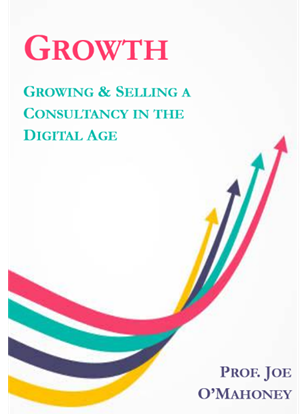Growing & Selling Consulting Firms: 3 insights from research

The embarrassment was palpable…. After leaving the consulting industry to (eventually) become a Professor of Consulting, my old colleagues occasionally contacted me to ask advice about growing (and often eventually selling) their consulting firms. Yet not only did I know little beyond the obvious, but, after some digging, there was virtually no credible research anywhere that could help.
Of course, there are the ‘this is how I did it’ monographs which were often too old to be useful (also, you cannot generalise from a case of one!). There are also umpteen books about starting a consultancy, but none about growing one. There are also the improbably young internet ‘gurus’ offering FREE!!!! webinars promising 3 SECRET HACKS!!! to earn 7 FIGURES A MONTH!!! Other than traditional British cynicism about hard sales from people in cheap suits, their online courses generally advise a sales funnel with ‘click-bait’ at which most clients would shudder. Such tactics are better used by nutrition coaches in California.
So, after a few years of offering advice that I felt was either common sense or unevidenced, I decided to begin a research project exploring how consultancies grow successfully and sell. After interviewing over 50 founders that have done precisely that, I am now nearing the finish of a book on the topic to be published with Routledge next Easter. The book is around 70,000 words and this piece is limited to 800, so it would not be prudent to list all the findings here, so instead I will focus on three important themes.
First, have a lie down. Shut your eyes. Pretend you’re a buyer. You have a hundred firms to choose from, so who gets on your short-list? Typically, a firm that is growing (min. average 20% PA), profitable (min. 20% EBITDA), safe (a long term, diverse client base and a good management team), with sizeable revenues (min. £4m), and a solid stable of intellectual property (tools, methods, software, but also strong thought leadership). If you’re not there (yet), which, if you’re still reading, I presume you’re not, then do you have a plan for getting there? Firms that explicitly plan for a sale, and set annual targets for revenue, clients, recruits (and promotions!) and other costs, are not only much more likely to achieve a sale but will do so faster and for a higher multiple of profits.
In addition to a plan, faster growth starts with a focused, profitable niche (most of the time). An initial narrow niche will enhance your brand, improve your expertise, develop your pricing skills, increase your value, and eventually help sell your firm. One of my interviewees said, ‘you need to get smaller in order to grow’. By this he meant that often, new consultancies will deliver pretty much anything in order to survive, but later, when cashflow is not a daily terror, they step back and look at what they can focus on in order to specialise and grow. The caveat here is that there is little point trying to grow in an over-competitive, low margin market. Even if you don’t intend to grow, greater profits will come from thinking creatively about how you can reframe your expertise in areas of high growth and high margins. The vast majority of small consultancies I’ve encountered fail to be brave enough in challenging the niche they inhabit.
Third, as the company grows to 20 people and beyond, it will save you time, effort and worry to anticipate some of the inflection points ahead of you. You will no longer be able to manage your team with a combination of your head and a few Excel spreadsheets - you should anticipate using some Professional Services Automation software; devolving work and decision-making without losing quality means that you need strong codified systems. Upskilling your staff whilst maintaining cost control necessitates continuously improved knowledge capture and management processes. Partners, including yourself, will most likely need training in governance, finance and even sales, unless you have previous expertise in these subjects. This requires what I’ve termed a ‘humble mindset’ - something some founders find challenging!
There was obviously a lot more I could have covered here, such as the importance of partnering early to develop economies of scale and scope; how to build systems which enable leverage; the importance of building different types of intellectual property; the weakness of most attempts at writing and sharing thought leadership; the power of LinkedIn in creating leads; developing a strong culture which will attract and retain recruits; and using automation and outsourcing to lower costs and increase margins. But then I wouldn’t sell any books….
GROWTH will be published by Palgrave in May 2021.
An online course will also be launched around the same time, a waiting list for which can be found here: